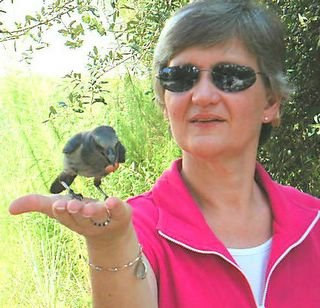 Our AB "friends" joined us for a fun time in Greenville, South Carolina, this past weekend (Oct. 13-14, 2006) at a regional AG Bell workshop. I was smiling, too, when I realized that I was hearing the seminar very well when I positioned myself under the ceiling speakers. The setting was a large ballroom where exhibitors framed the many rows of attendees. An acoustic challenge for the average hearer, I would think. Hip hip HOORAY for my bionic ear!
Our AB "friends" joined us for a fun time in Greenville, South Carolina, this past weekend (Oct. 13-14, 2006) at a regional AG Bell workshop. I was smiling, too, when I realized that I was hearing the seminar very well when I positioned myself under the ceiling speakers. The setting was a large ballroom where exhibitors framed the many rows of attendees. An acoustic challenge for the average hearer, I would think. Hip hip HOORAY for my bionic ear!
Monday, October 23, 2006
AB's Beanie Buddies
Monday, July 03, 2006
Fireworks in 2006
A deluxe fireworks show is so much more than a visual experience. I learned this back in 2001 when I thrilled to my first fir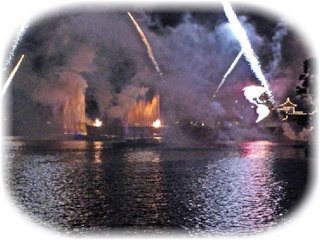 eworks display with a cochlear implant. But this year was another memory maker because of an event sponsored by Advanced Bionics at the Hearing Loss Association of America's annual convention at Disney World in Orlando. Imagine experiencing a grand fireworks extravaganza at Epcot in the company of scores of other CI users!
eworks display with a cochlear implant. But this year was another memory maker because of an event sponsored by Advanced Bionics at the Hearing Loss Association of America's annual convention at Disney World in Orlando. Imagine experiencing a grand fireworks extravaganza at Epcot in the company of scores of other CI users!
The lady sitting next to me had a first generation implant like mine and we both heard the synchronized orchestral music, the descending whistle sounds as the visual spirals cascaded downward, the bean-shaker sizzling sound with the ones that look like white rain, and the standard launch phoosh and subsequent booms and crackles as the pyros burst into color. Incredible!
I got teary-eyed as I took it all in, thinking about what all of us would be missing if the music and sound were absent. For me, if it had been 5 years earlier, it would have meant turning off my hearing aid because of the pain I always endured in the presence of loud sounds and just standing there in total silence. The display would have been one dimensional, a mere visual display of movement and color. Granted, that visual drama would have been a pleasure, but the difference when you add the sound field is an exponential one. It fits in the issue of quality of life, I think.
Having the blessing of a cochlear implant not only allows me the emotional thrill of all the elements of the pyrotechnics but, more importantly, the too-often-taken-for-granted joy of conversing with my new CI acquaintance about the experience we just enjoyed together. What a spectacular evening!
Monday, June 12, 2006
Sunday, May 14, 2006
Mother's Day, 2006

I had an exciting, once-in-a-lifetime opportunity to surprise my mom at a ladies luncheon on Saturday. Unbeknownst to her, I had submitted a tribute about her which was chosen to be one of three to be presented after the meal and before the keynote speaker. I had also submitted a set of pictures and had gone to the church's sound booth for a recording session prior to the event so that it would be done as an audio-visual on full screen for the 600 attendees to see and hear. The look on Mom's face will be forever etched in my memory! This is what I said:
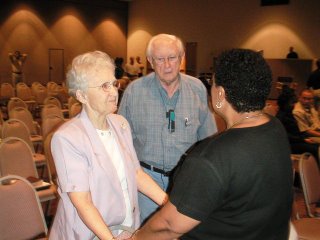 ected with people. I’ve observed her affirming nods and inviting smiles after greeting and initiating a conversation with an acquaintance or a newcomer, knowing full well that she was not getting most of what was being shared. I’ve been awed by her ability to make each one feel welcomed and engaged, despite the fact that she’s often virtually clueless as to the content of the dialogue.
ected with people. I’ve observed her affirming nods and inviting smiles after greeting and initiating a conversation with an acquaintance or a newcomer, knowing full well that she was not getting most of what was being shared. I’ve been awed by her ability to make each one feel welcomed and engaged, despite the fact that she’s often virtually clueless as to the content of the dialogue.Why doesn’t she just stay home instead of struggling through all the unsuccessful social encounters? Why not withdraw from social obligations, from
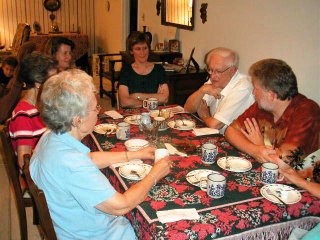 volunteer work at the church’s Resource Center, from inviting people to the house for a home-cooked meal and an evening of fellowship? How is it that she does not lose heart? I’ve seen that momentary flash of discouragement in her eyes after a long-distance phone call from my brother and his family, yet she gives a happy hello the next time they call and asks for the umpteenth time, “What’d they say?”, after Dad hangs up the phone.
volunteer work at the church’s Resource Center, from inviting people to the house for a home-cooked meal and an evening of fellowship? How is it that she does not lose heart? I’ve seen that momentary flash of discouragement in her eyes after a long-distance phone call from my brother and his family, yet she gives a happy hello the next time they call and asks for the umpteenth time, “What’d they say?”, after Dad hangs up the phone.You see, I know what it’s like to live in a world of missed conversations and agonizing isolation amidst a crowd. I have felt that hot flush of embarrassment when I’ve realize that I’ve misunderstood once again or have said something inappropriate. I’ve known the deep heartache that engulfs you when you can no longer recognize a once beloved and familiar hymn. I, too, have made the painful journey from normal hearing to severe hearing loss. In my case, however, the pilgrimage “progressed” to total deafness.
Yet, I thank my gracious and loving heavenly Father for giving me a courageous mom who has shown me how to weather the storm and to trust His precious promises. God knew before I was ever conceived that I would need such a wonderful role model. Jeremiah 29:11 says, " For I know the plans I have for you, declares the Lord, plans for welfare and not for calamity to give you a future and a hope." He also knew that the miracle of a cochlear implant would restor
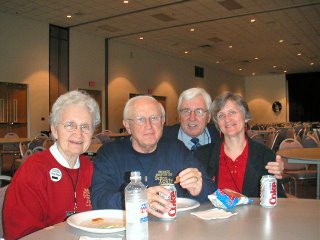 e my hearing and allow me the privilege of being Mom’s “ears” again whenever there’s an opportunity. It is truly a divine blessing to sit beside her today and to help her “stay connected” to God’s people.
e my hearing and allow me the privilege of being Mom’s “ears” again whenever there’s an opportunity. It is truly a divine blessing to sit beside her today and to help her “stay connected” to God’s people.Wednesday, May 03, 2006
A Disaster Simulation

Last month’s topic at my CI support group was emergency medical issues and cochlear implants. We discussed medical identification jewelry, the training (or lack of) that's given to local hospital ER personnel concerning how to deal with hearing impaired patients, and other issues related to safety. So when a notice was posted on our community bulletin board, “Volunteers needed to act as victims in a county-wide disaster simulation exercise”, Gerry and I signed up. Here’s my chance, I thought, to witness firsthand how a deaf person is treated during a large-scale emergency medical crisis.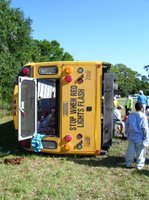
The scenario was a terrorist-incited explosion which resulted in an accident involving a bus and an ambulance. A group of us with all manner of realistic mock injuries were stationed inside the bus. Gerry was "assigned" a broken femur bone (left leg) and I was to be mentally altered, confused and disoriented but otherwise unharmed. I wore my medical ID necklace over my torn and stained T-shirt.
With a healthy mixture of excitement and trepidation, I pocketed my BTE as soon as the sound of sirens signaled their eminent approach. Obviously, my world went silent and the experiment commenced. About 4 hours later, after being triaged to a yellow tarp in the field, transported to a local hospital, and processed for treatment, the drill was over. I eagerly re-connected my BTE to my internal implant and, voila, the glorious sounds of the real world were suddenly mine again!
What did I learn from this unusual experience? For what it’s worth, here are my observations:
1. The policemen and firefighters were not interested in reading my medical ID. Perhaps they ignored my frantic cries of “I’ve lost my implant. I can’t hear!” and my waving my medical ID pendant for their inspection because they knew me to be “out-of-it”.
2. The assumption made by all rescue personnel assigned to me, both in the field and at the hospital, was that I knew sign language. It was even recorded on one of my hospital forms. Do they not know that most late-deafened adults grew up in the hearing world and never learned sign language? ASL is only useful if the other party also “speaks the same language”!
3. No one thought to write down the questions they were asking me or to point to the questions on the form. Apparently being deaf means that you are also illiterate!
4. I felt very vulnerable and totally dependent on my powers of observation, acutely aware of the reality of the fact that this simulated exercise would have been my real world experience if not for the miracle of CI technology. Thank God for my bionic ear!
5. Being functional deaf is as exhausting as I remembered it to be. When we arrived home, I took two aspirins and headed for the couch.



